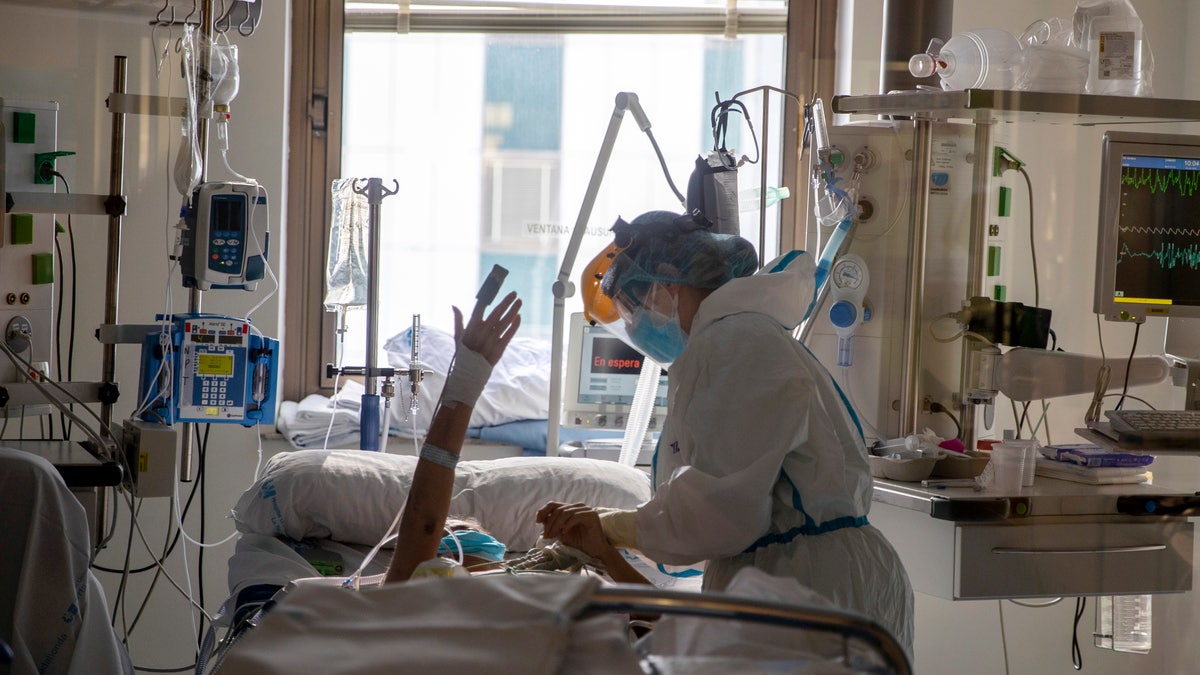Study finds nearly all NY coronavirus patients suffered underlying health issue
Dr. Mehmet Oz reacts on 'Fox & Friends.'
Get all the latest news on coronavirus and more delivered daily to your inbox. Sign up here.
With the number of coronavirus cases nearing one million in the U.S., those at the highest risk for severe illness from the virus include the elderly and those with underlying medical conditions, according to the Centers for Disease Control and Prevention (CDC).
A study published in the CDC's Morbidity and Mortality Weekly Report this month found that about 90 percent of those patients hospitalized with the virus had one or more underlying conditions.
People with chronic medical conditions often have a weakened immune system, which means they are less capable of fighting off attacks from bacteria or viruses.
NEARLY ALL NY CORONAVIRUS PATIENTS SUFFERED UNDERLYING HEALTH ISSUE, STUDY FINDS

Healthcare workers assist a COVID-19 patient at one of the intensive care units (ICU) of the Ramon y Cajal hospital in Madrid, Spain on April 24. People with chronic medical conditions often have a compromised immune system, which means they are less capable of fighting off attacks from bacteria or viruses.
(AP Photo/Manu Fernandez)
"These findings underscore the importance of preventive measures [social distancing, respiratory hygiene, and wearing face coverings in public settings where social distancing measures are difficult to maintain] to protect older adults and persons with underlying medical conditions," the agency said.
So what is an underlying condition?
An underlying health condition is described as a chronic or long-term illness, which can weaken the immune system necessary for fighting off infection.
"This refers to a medical problem that is usually chronic or significant, and which usually requires long-term treatment," Dr. Roger Henderson, medical director at Liva Healthcare told patient.info.
People with chronic medical conditions often have a weakened immune system, which means they are less capable of fighting off attacks from bacteria or viruses. If not controlled, an underlying health condition can impact people of all ages, not just the elderly.
"With the immune system already tackling another long-term illness this affects your body's ability to respond as quickly to exterior factors, which puts these individuals at a greater risk of contracting further illnesses if exposed," said Dr. Diana Gall, from online service Doctor 4 U, according to the website.
Underlying medical conditions listed by the CDC include chronic lung disease, asthma, heart conditions, immunocompromised, obesity, diabetes, chronic kidney disease, and liver disease.
"Many conditions can cause a person to be immunocompromised, including cancer treatment, smoking, bone marrow or organ transplantation, immune deficiencies, poorly controlled HIV or AIDS, and prolonged use of corticosteroids and other immune weakening medications," the agency said.
Certain immune-weakening medications can impact a person's immune function. Chemotherapy targets cancer cells but can also limit the number of white blood cells, which are described as your body's immunity cells.
White blood cells are necessary for fighting off infections in the body, and losing them could cause a person to have a weakened immune system, according to the University of Rochester Medical Center.
A strong immune system is needed to help battle a coronavirus infection.
The study published by the CDC's Morbidity and Mortality Weekly Report found that hypertension (49.7 percent), obesity (48.3 percent), chronic lung disease (34.6 percent), diabetes mellitus (28.3 percent), and cardiovascular disease (27.8 percent) were the most common underlying conditions of those hospitalized due to COVID-19.
CORONAVIRUS CRISIS: WHAT ARE THE POTENTIAL LONG-TERM HEALTH IMPACTS?
Heart disease -- an underlying health condition -- is also considered a potential problem for those infected. While COVID-19 mainly impacts the lungs, it causes the heart to work harder, which is challenging for people already living with the disease, according to Johns Hopkins Medicine.
The elderly are also seen as a high risk for severe illnesses because they are likely to have more long term health problems. Your immune system usually weakens with age, making it harder for them to fight off infections.
"Coronavirus can affect everyone. But those with chronic health problems are more at risk because they are typically older. Older patients seem particularly vulnerable to coronavirus, especially those over the age of 80," Henderson added.
"This can be coupled with an underlying health condition, putting their immune system under increased pressure."
CLICK HERE FOR MORE CORONAVIRUS COVERAGE
Older adults and those with underlying health conditions are advised to stay home to avoid being around others, according to the CDC.









































